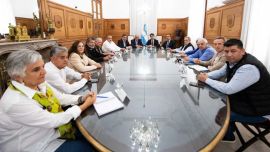PENSION REFORM: CHAOS IN THE CALLES, CHAOS IN THE CONGRESS
The government’s pension reform bill tweaking the updating of retirement and other benefits, which had already been approved by the Senate, failed to reach the Lower House floor last Thursday in the wake of violent protests outside Congress and messy scenes inside the chamber. Had it been approved, it would have sparked a CGT general strike the next day, which was lifted. The government seems keen to press ahead, one way or another.
SUPREME COURT RULING ON RELIGIOUS EDUCATION IN SALTA
The Supreme Court on Tuesday ruled against a Salta provincial law incorporating religious instruction into the curricula of public schools, although permitting catechism after class (private confessional schooling is unaffected by the decision).
The 95-page ruling was passed by a 4-1 ruling with Justice Horacio Rosatti dissenting over questions of form rather than substance. The court considered that the teaching of religion in the public schools of Salta was a “discriminatory” fact and that “it violates the principle of equality and non-discrimination that should guide” educational policies. While this ruling might seem a triumph of modern times over tradition, the provincial law introducing religious education is in fact a recent innovation by the current Salta Peronist Governor Juan Manuel Urtubey whereas nationwide the legal principle of lay education in public schools goes all the way back to 1889. Since Urtubey’s law mandated only Catholic instruction, the ruling was celebrated not only by unbelievers but also by other religious minorities, among whom the Church of England is surprisingly one of the most important – not because there are many Anglo-Argentines but because a high percentage of the indigenous were converted by Anglican missionaries, numerous enough to make Salta one of Canterbury’s two dioceses in Argentina alongside Buenos Aires.
AMIA-NISMAN-INTERPOL CONTROVERSY
While there were no significant developments inside the courtroom in the nine days since Federal Judge Claudio Bonadio requested the arrest of Senator Cristina Fernández de Kirchner for “treason” in her presidency’s 2013 memorandum of understanding with Iran, controversy continued. An Iranian “admission” that this treaty included a “seventh clause” lifting Interpol red-notice arrest warrants against five Iranian officials accused of masterminding the 1994 terrorist bombing of AMIA Jewish community centre was widely reported but denied by former Interpol chief Ronald Noble. Meanwhile Bonadio rejected any relaxation of former Foreign Minister Héctor Timerman’s house arrest to permit cancer treatment abroad.
GOVERNMENT HUMAN RIGHTS PLAN
At a ceremony also featuring by President Mauricio Macri and Cabinet Chief Marcos Peña, Human Rights and Cultural Pluralism Secretary Claudio Avruj launched a new five-pronged, three-year plan for human rights in which “memory, truth and justice” regarding the 1976-83 military dictatorship is to be only one of the five component, outlets this week reported. The other four clusters are the rights to public safety, to inclusion, to protection against discrimination and to various social amenities including healthcare, education, running water and sewage. Many of the country’s most well-known human rights organisations were absent, including the leaders of the Mothers and Grandmothers of Plaza de Mayo.
CARMEN LAPACÓ DIES
Carmen Aguiar de Lapacó, a leading figure of Mothers of Plaza de Mayo and a founding member of the Centre for Legal and Social Studies (CELS), died on Wednesday at the age of 93. In 1977 she was kidnapped under the military dictatorship along with her daughter Adriana, whom she never saw again, but released three days later.
WTO MEETING WON’T LIVE LONG IN THE MEMORY
The 11th Ministerial Conference of the World Trade Organisation (WTO) wound up on Wednesday without any clear results – and without even the worst protests of the week (contrary to the history of some previous WTO summits) although they were sufficient to cause traffic havoc downtown. But Argentina’s distance from the world’s main centres of population plus the government’s legally dubious move in barring the entry of 64 international activists made the anti-globalisation demonstrations a shadow of the protests against the Mauricio Macri administration’s domestic reforms later in the week.
Macri had publicly stated hopes that this global summit would give birth to a free trade agreement between the European Union and Mercosur blocs but these hopes were doomed to frustration with no visible progress despite the “historic advances” announced.
Nor did the government obtain any joy on a second line of objectives such as fisheries (the removal of subsidies and restrictions against illegal trawling) or agriculture (including food stockpiling as well as farm subsidies). On the plus side, Susana Malcorra (ex-foreign minister) received praise from WTO’s members and its chief Roberto Azevêdo, as well as British ambassador to BA Mark Kent. In the words of the Wall Street Journal’s write-up, “progress was minimal.”
PICHETTI OUT
Joanna Pichetti, eigth of the eight deputies elected for this city on Elisa Carrió’s pro-government Vamos Juntos list last October, was finally denied her seat by a National Electoral Court ruling last Tuesday. Carrió herself demanded Pichetti’s exclusion followed accusations of abusive treatment of her children lodged by her ex-husband. City court official Jorge Enríquez now takes her Lower House seat while Picetti said she would appeal to the Supreme Court.






















Comments